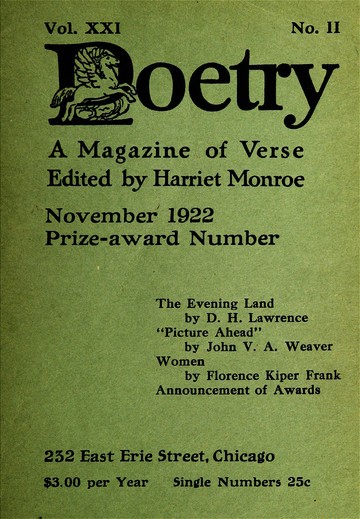THE EVENING LAND
By:
February 5, 2023
A (pro- or anti-) science-, mathematics-, technology-, space-, apocalypse-, dehumanization-, disenchantment-, and/or future-oriented poem published during sf’s emergent Radium Age (c. 1900–1935). Research and selection by Joshua Glenn.

Oh, America
The sun sets in you.
Are you the grave of our day?
Shall I come to you, the open tomb of my
race?
I would come, if I felt my hour had struck.
I would rather you came to me.
For that matter
Mahomet never went to any mountain
Save it had first approached him and
cajoled his soul.
You have cajoled the souls of millions of us,
America,
Why won’t you cajole my soul?
I wish you would.
I confess I am afraid of you.
The catastrophe of your exaggerate love,
You who never find yourself in love
But only lose yourself further,
decomposing.
You who never recover from out of the
orgasm of loving
Your pristine, isolate integrity, lost aeons
ago.
Your singleness within the universe.
You who in loving break down
And break further and further down
Your bounds of isolation,
But who never rise, resurrected, from this
grave of mingling,
In a new proud singleness, America.
Your more-than-European idealism,
Like a be-aureoled bleached skeleton
hovering
Its cage-ribs in the social heaven,
beneficent.
And then your single resurrection
Into machine-uprisen perfect man.
Even the winged skeleton of your bleached
ideal
Is not so frightening as that clean smooth
Automaton of your uprisen self,
Machine American.
Do you wonder that I am afraid to come
And answer the first machine-cut question
from the lips of your iron men?
Put the first cents into metallic fingers of
your officers
And sit beside the steel-straight arms of
your fair women,
American?
This may be a withering tree, this Europe,
But here, even a customs-official is still
vulnerable.
I am so terrified, America,
Of the iron click of your human contact.
And after this
The winding-sheet of your self-less ideal
love.
Boundless love
Like a poison gas.
Does no one realise that love should be
intense, individual,
Not boundless.
This boundless love is like the bad smell
Of something gone wrong in the middle.
All this philanthropy and benevolence on
other people’s behalf
Just a bad smell.
Yet, America,
Your elvishness.
Your New England uncanniness,
Your western brutal faery quality.
My soul is half-cajoled, half-cajoled.
Something in you which carries me beyond,
Yankee, Yankee,
What we call human.
Carries me where I want to be carried…
Or don’t I?
What does it matter
What we call human, and what we don’t call
human?
The rose would smell as sweet.
And to be limited by a mere word is to be
less than a hopping flea, which
hops over such an obstruction at first
jump.
Your horrible, skeleton, aureoled ideal.
Your weird bright motor-productive
mechanism,
Two spectres.
But moreover
A dark, unfathomed will, that is not un-
Jewish;
A set, stoic endurance, non-European;
An ultimate desperateness, un-African;
A deliberate generosity, non-Oriental.
The strange, unaccustomed geste of your
demonish New World nature
Glimpsed now and then.
Nobody knows you.
You don’t know yourself.
And I, who am half in love with you,
What am I in love with?
My own imaginings?
Say it is not so.
Say, through the branches
America, America
Of all your machines,
Say, in the deep sockets of your idealistic
skull,
Dark, aboriginal eyes
Stoic, able to wait through ages
Glancing.
Say, in the sound of all your machines
And white words, white-wash American,
Deep pulsing of a strange heart
New throb, like a stirring under the false
dawn that precedes the real.
Nascent American
Demonish, lurking among the undergrowth
Of many-stemmed machines and chimneys
that smoke like pine trees.
Dark, elvish,
Modern, unissued, uncanny America,
Your nascent demon people
Lurking among the deeps of your industrial
thicket
Allure me till I am beside myself,
A nympholepht.
‘These States!’ as Whitman said,
Whatever he meant.
— 1922 poem.

RADIUM AGE PROTO-SF POETRY: Stephen Spender’s THE PYLONS | George Sterling’s THE TESTIMONY OF THE SUNS | Archibald MacLeish’s EINSTEIN | Thomas Thornely’s THE ATOM | C.S. Lewis’s DYMER | Stephen Vincent Benét’s METROPOLITAN NIGHTMARE | Robert Frost’s FIRE AND ICE | Aldous Huxley’s FIFTH PHILOSOPHER’S SONG | Sara Teasdale’s “THERE WILL COME SOFT RAINS” | Edith Södergran’s ON FOOT I HAD TO… | Robert Graves’s WELSH INCIDENT | Nancy Cunard’s ZEPPELINS | D.H. Lawrence’s WELLSIAN FUTURES | & many more.
